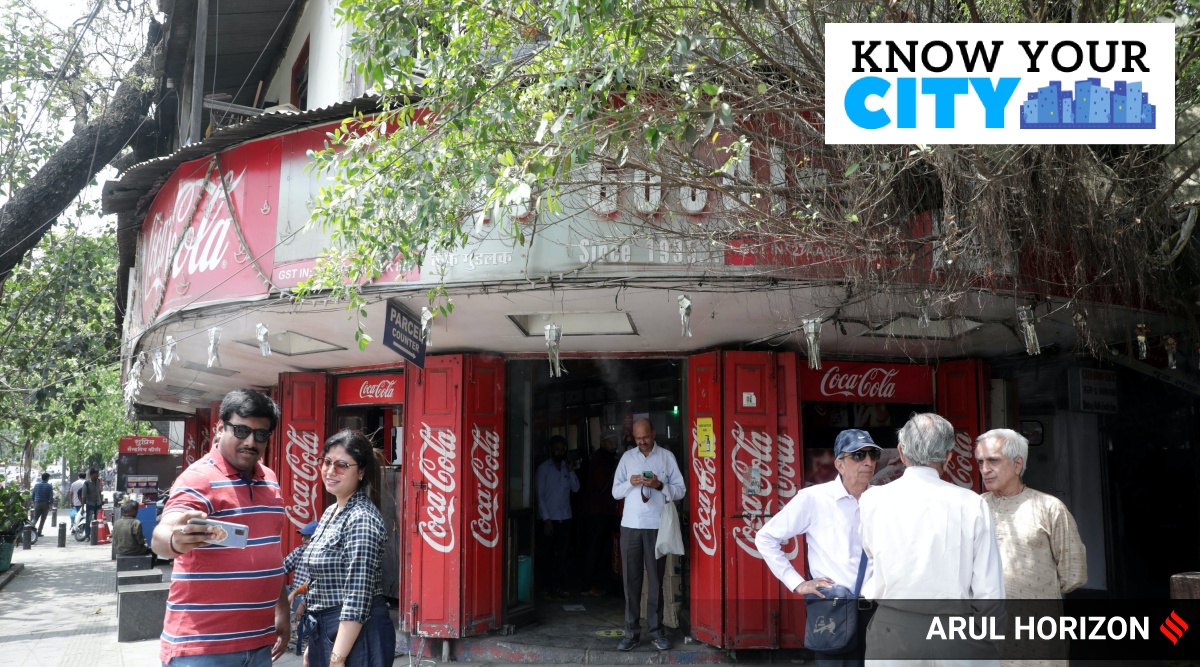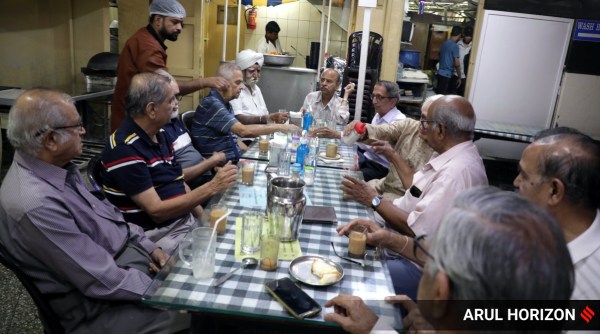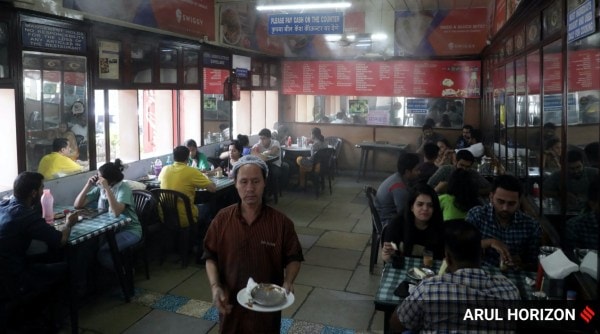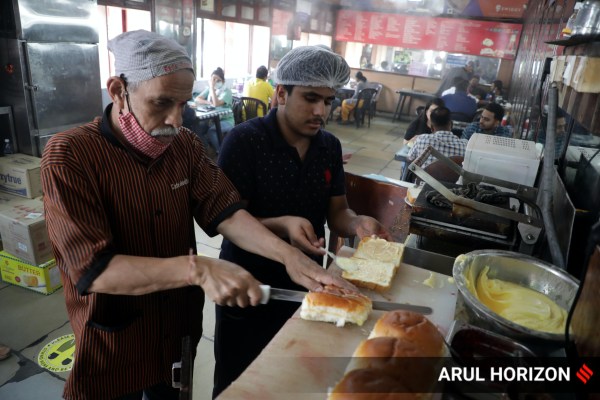 Goodluck cafe on FC road.
Goodluck cafe on FC road. At the time when samosas were two annas a piece and a cup of tea cost one anna, a group of young men would meet at an Irani restaurant near Fergusson College and talk for hours. Over the years, the group expanded to include friends, friends of friends and colleagues before old age and death began to take their toll. But, even now, every Thursday, 10.30 am to 11.30 am, the surviving friends, who are in their late seventies and eighties, keep their appointment at Cafe Goodluck. And the restaurant holds a centre table for them.
The group calls itself the Goodluck Friends and boasts that most members have been coming to the restaurant since 1965 and some from 1955. “Where there is the crowded FC Road footpath now, Cafe Goodluck used to keep the tables under giant trees. We used to face the road and watch people, especially students, going past as we talked for hours,” says Gursharan Singh Sahney, 77. “We never used to get two cups of tea at a time. We would order one cup of tea, called lamba paani, which contained more water and less milk to increase the volume. It was poured into two glasses and shared. This way, if there were seven to eight people at the table, we had to pay for four cups only,” says Suresh Dandekar.
Cafe Goodluck is located in a part of the Deccan Gymkhana area that used to be a sylvan neighbourhood with tall trees, colonial bungalows, narrow lanes, a school, a bakery and almost no street lights, before it turned into one of the city’s thriving commercial districts with almost no residences. As the Goodluck Friends have a party, other tables are occupied by different generations conducting their own conversations and negotiations.
 A group of men who have been frequenting the cafe since 1965.
A group of men who have been frequenting the cafe since 1965. The attraction of Cafe Goodluck is that it is there — a no-frills restaurant that has become an institution in a fast-changing city. Historian Pandurang Balkawade calls it “a part of the cultural identity of Pune”. On Cafe Goodluck’s menu are items that have stood the test of time – bun-maska, omelette and tea that can keep one going for several hours — as well as recent favourites such as Nutella bun with cheese and butter.
Students and pensioners, who once made up Pune’s demographic, have been joined by techies, start-up founders and corporates, among others. Cafe Goodluck has remained a draw through the changing years. “We open at 7.30 am, when people going to office come in for breakfast, and go on till 11 pm with rarely a lull. I think that my father did something right with the restaurant,” says owner Ghasem Yakshi.
One thousand people come to Goodluck Cafe every weekday and 1,500 on weekends, many of them second and third generation clients. Most visitors, as they file in and out, do not notice the framed black-and-white photographs that hang above the two bill counters of the restaurant. It is of Hussain Ali Yakshi, Ghasem’s father, an unrelenting, risk-taking businessman who shaped Cafe Goodluck in a way that makes it relevant even today.
 Students and pensioners, who once made up Pune’s demographic, have been joined by techies, start-up founders and corporates, among others. Cafe Goodluck has remained a draw through the changing years.
Students and pensioners, who once made up Pune’s demographic, have been joined by techies, start-up founders and corporates, among others. Cafe Goodluck has remained a draw through the changing years. Hussain was born in Taft, in the Yazd province of central Iran, a desert region, where survival depended on mental and physical stamina. “In his youth, families had a miserable life due to famine and political issues. At the time, a large number of Parsi Iranians were residing in Mumbai and Gujarat. When one of these good and helpful Parsis came to Taft for a vacation, my father approached him for help to take him to India for a better life,” says Jafar Yakshi, Hussain’s eldest son who is based in the US.
A young man who knew only Persian — he never learnt to write Hindi, English or Marathi though he spoke these — Hussain migrated to Mumbai in the 1920s and started to work in the restaurant of his Parsi friend as a table boy and, then, as a part of the service staff. “As he was found trustworthy by the owner, my father was given restaurant cashier duty. He worked in Mumbai for about more than eight years,” says Jafar. This was also the time that Hussain had his first asthma attack and was advised to move to the drier city of Poona. According to Sahapedia, Hussain took over “a small place in the Deccan Gymkhana area” from a man called Narayan Seth in 1932 and set up a small food joint.
As the board of Cafe Goodluck proclaims, it was established in 1935. But, a few years ago, when Ghasem was moving house, he found brittle documents, such as a licensing receipt from 1924, which suggested that the restaurant was at least a decade older. “As he was barely educated, dates and records didn’t mean much to my father,” says Ghasem.
Hussain began by serving tea and coffee, characteristic of every Irani restaurant, as well as fast-moving items such as cigarettes, safety pins and batteries at a store attached to it. “Students of Fergusson College were among the first to realise that Cafe Goodluck served really good tea, and that’s how the train got on the track,” says Ghasem. As business started improving, Hussain began to buy nearby shops, of a man selling charcoal, a two-wheeler mechanic, a barber and a cycle repair workshop etc. The present structure of the restaurant—3,600 sq ft that seats 250 — came together in the 1960s and has not changed.
 As the board of Cafe Goodluck proclaims, it was established in 1935.
As the board of Cafe Goodluck proclaims, it was established in 1935. “Over the last 75-100 years, Irani restaurants such as Cafe Goodluck, Paradise, Sunrise and Naaz and Kohinoor in Camp have become institutions in the city. But, even in the 1970s, it was forbidden for people from Narayanpeth, Sadashiv Peth and Ravivar Peth, where the Brahmin families stayed, to venture into these restaurants. If a Brahmin from these peths was seen in these hotels, they were ostracised. But slowly, they also came around,” says Balkawade.
Audacious, Hussain started a non-vegetarian menu though the area was dominated by vegetarians. The older generation never visited Cafe Goodluck but the younger ones were interested. “It took a lot of courage to sell non vegetarian and, initially, business was bad. Like all Irani restaurants, we have family rooms, which were cubicles with doors. Even when the common dining section was empty, my father saw that there used to be a queue for these cubicles as boys and girls wanted to eat non vegetarian hidden from their parents,” says Ghasem.
Today, Cafe Goodluck is one of the few places in the city where a non-vegetarian meal for two comes for around Rs 600. “One of the reasons we used to flock to Cafe Goodluck in olden days was that we could get non-veg for as little as Re 1 and 12 annas, which is a quarter to two rupees. The cheapest on the menu was quarters of boiled eggs with a consistent thick coating of gravy that came with slices of soft bread,” says Sahney .
By the mid-1900s, Cafe Goodluck had become a habit for many. From industrialist Narayan Murthy to politicians such as Sharad Pawar to artists who conducted shows at Bal Gandharva or were honing their skills at Film and Television Institute of India (FTII), a cross-section of diners would frequent Cafe Goodluck. “When we were young, we used to have a great desire to go to Cafe Goodluck to drink tea and eat omelette. We used to go at least once a week. Sometimes we used to see actors Jeetendra or Rakesh Roshan there. People of different interests could come here,” says Balkawde. The restaurant used to open at 5 am, to serve tea to morning walkers who would, otherwise, “bang on the door”.
As FC Road became one of the city’s arteries and the nature of the place changed, Cafe Goodluck altered its timings to open at 7.30 am for breakfast of bread, eggs and beverage to people taking an early bus to office.
The Goodluck Friends recall that when the Pune Municipal Corporation (PMC) introduced buses, the tongawallahs predicted its quick death as there were no passengers. “PMC tried to attract people by making rides free for one month. Buses were known for their discipline and not more than six people were allowed to be standing,” says Sahney Now, he lives around 14 km from Cafe Goodluck and every Thursday, has to plan his schedule for the best and smoothest route to the meeting with his friends.
Hussain was fastidious in the creation of his legacy. Even in his last days, when his arthritic legs could barely let him walk, he would hire an auto-rickshaw to bring him to the restaurant from his home opposite the road. “For my Class VII holidays, I told my dad that I wanted to help him in the restaurant. The next day, I arrived with attitude, wearing a formal shirt and a pair of neat trousers. He pointed to a man cleaning tables and asked me to join him. That was a rude shock but I realise that it was invaluable in learning the business. I have worked in every department, just as my dad had done,” says Ghasem.
Many old clients remember Ghasem Sr, the uncle of the present owner and Hussain’s stepbrother from Iran, running the restaurant. “He used to give us a complete tray of samosas. We ate our fill and he would take away the remaining pieces, and charge us accordingly. That was his concept of pushing up sales, otherwise we would have ordered only four or five pieces,” says Sahney.
Ghasem is, possibly, the last of the family to operate Cafe Goodluck. Most of the family has migrated and taken up other professions. “The people who started Irani restaurants had come to India with the objective of making a better life because they did not have resources in Iran. Most of them were barely educated. The younger generation has many opportunities and most of them do not want to join the family business,” he says.
For now, the cups of tea and long conversations continue at Cafe Goodluck.
- The Indian Express website has been rated GREEN for its credibility and trustworthiness by Newsguard, a global service that rates news sources for their journalistic standards.

